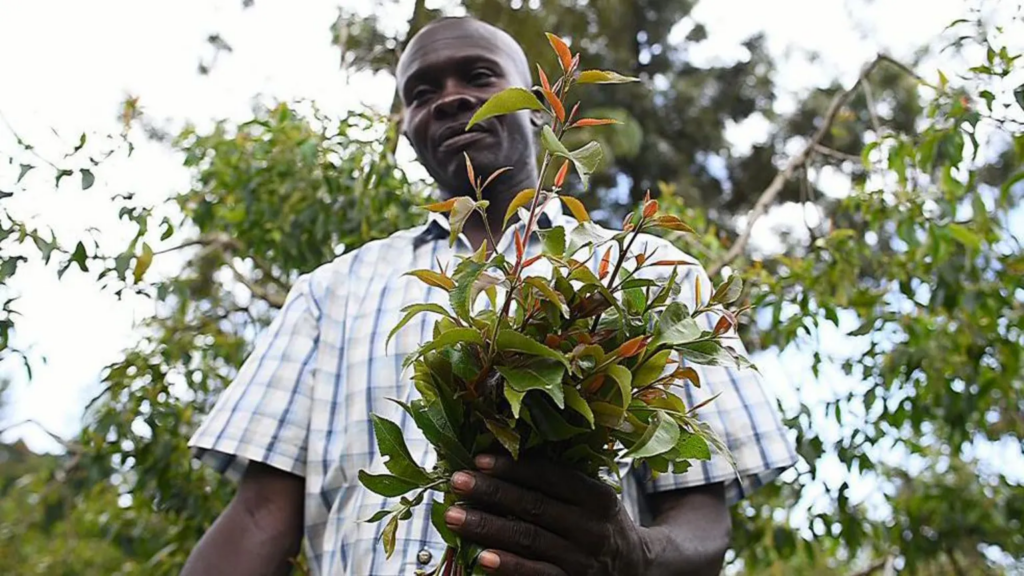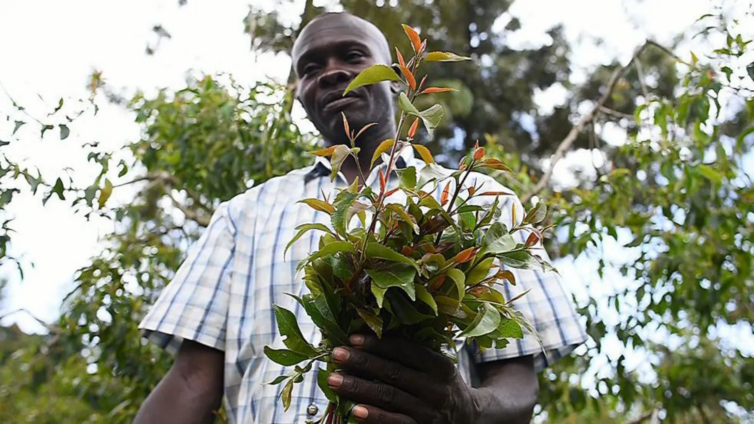Kenya's President William Ruto has reversed a contentious ban imposed in parts of the country on muguka, a variety of the popular stimulant known as khat or miraa.
The consumption of the freshly plucked buds and soft leaves has been blamed for a rise in mental health issues and increased social ills, including crime.
Three county governors from the coastal region banned its sale and use last week, sparking anger in the areas where the crop is grown.
President Ruto on Monday said the muguka crop was legal and its sale should not be prevented.
Muguka, a cheaper, more potent and addictive variety of the plant, is popular in the coastal counties of Mombasa, Kilifi, Taita Taveta and Kwale.
Last week, Mombasa Governor Abdulswamad Shariff Nassir banned the entry, transportation, sale and consumption of muguka citing its harmful effects, especially on young people.
Governor Nassir said more than half the people recovering in Mombasa rehabilitation centres were muguka addicts.
A similar directive was issued by the governors of Kilifi and Taita Taveta counties who vowed to crack down on its sale and use.

It sparked protests in the muguka-growing county of Embu, with farmers and traders decrying the risk of closing businesses due to the ban on the lucrative crop.
On Monday, President Ruto held a meeting with local leaders from Embu in an effort to end the muguka row.
“With muguka having been recognised by national legislation, any other laws or orders that contradict national legislation is null and void,” Mr Ruto said in a statement issued by the president's office.
President Ruto said muguka was a legal crop under the Crops Act 2013 and the Miraa Regulations 2023.
He said the government would allocate $3.7m (£3m) in this financial year to expand khat farming in the country.
Two activists had also challenged the muguka ban in court.
More than 10 traders were arrested last Friday in the main coastal city of Mombasa as the ban on the stimulant took effect, local media reported.
The ban had gained widespread support from religious organisations, with Muslim leaders in Mombasa calling for muguka to be categorised as a restricted drug.
Although the National Agency for the Campaign Against Drug Abuse has not banned muguka, it has classified it as a harmful substance based on the stimulants cathinone and cathine found in the plant.
"The amounts of cathinone and cathine are very high in muguka because you are chewing the leaves, where the potency resides," John Mututho, the former chief of the anti-drug abuse agency, told a local TV station.
He said the chemicals in muguka had impaired normal body functions.
"Let's invest in other herbs like rosemary. Farmers will be very rich, and we will not have zombies," Mr Mututho added.
Latest Stories
-
CJ removal: ‘Democracy is not the law’ – Abraham Amaliba warns against constitutional overreach
1 hour -
Former DR Congo PM sentenced to hard labour on corruption charge
2 hours -
M&S website completely down, leaving users unable to browse
2 hours -
Two Israeli embassy staff shot dead in attack at DC Jewish museum
2 hours -
CJ removal: ‘When the Constitution says ‘shall’, it means ‘shall’ – Kwaku Ansa-Asare
2 hours -
‘CJ should have gone to Judicial Council first not Supreme Court’ – Kwaku Ansa-Asare
3 hours -
‘CJ’s Supreme Court move a provocation of committee’ – Ansa-Asare blasts Justice Torkornoo’s action
5 hours -
Ramaphosa survives mauling by Trump over ‘white genocide’
6 hours -
Ramaphosa keeps cool during Trump’s choreographed onslaught
6 hours -
Veep of National House of Chiefs criticises governance culture of abandoning state projects
6 hours -
Ex NYC Governor Andrew Cuomo under investigation for Covid testimony
6 hours -
OKESS firearm case: Student, stepfather granted GH¢80,000 bail
6 hours -
Ghana throws open its doors with visa processing slashed to 5 days in dramatic policy reset
7 hours -
Italy tightens rules for Italian descendants to become citizens
7 hours -
Trump ambushes S African leader with claim of Afrikaners being ‘persecuted’
7 hours

